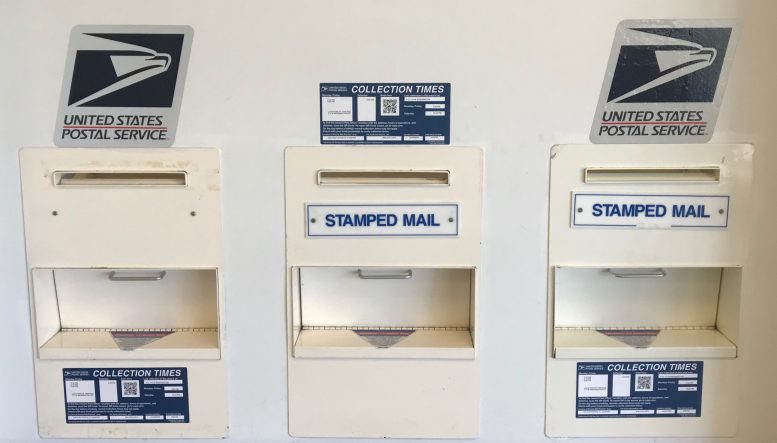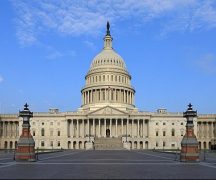WASHINGTON — Postmaster General Louis DeJoy said Tuesday that he will halt a series of sweeping policy changes to the U.S. Postal Service until after the general elections this fall.
DeJoy said he will not change overtime rules, retail hours at local post offices, or the location of mail processing equipment and blue collection boxes, nor will he close any existing mail processing facilities.
He also said the agency will use “standby” resources as of Oct. 1 to meet a possible surge in mail due to the elections.
“To avoid even the appearance of any impact on election mail, I am suspending these initiatives until after the election is concluded,” he said in a statement. He said the agency is “ready today to handle whatever volume of election mail it receives this fall.”
The announcement came hours after a Senate oversight panel announced DeJoy will testify Friday in a hearing on policy changes to the agency that critics said could jeopardize the integrity of the fall elections, the day before the House plans a rare weekend vote on Postal Service legislation.
The Senate panel’s chairman, Wisconsin GOP Sen. Ron Johnson, had been under intense pressure from Democrats to convene a hearing of his Homeland Security and Governmental Affairs Committee to examine reports of delays and other widespread problems at the Postal Service.
DeJoy, who took the job in June, has come under fire in recent months for changes to overtime and delivery policies, which critics said could disenfranchise voters and threaten Americans’ health and finances.
The agency also reportedly planned to remove hundreds of mail-sorting machines at facilities across the country, according to CNN.
DeJoy will testify Friday about post office financing and operations during the pandemic and in preparation for the November elections. He has said changes are needed to operate within a constrained budget, but he has privately acknowledged that they have “unintended consequences,” according to CNBC.
On Saturday, the U.S. House will convene and vote on a measure providing $25 billion in postal service funding, according to Politico, and barring the agency from changing operations or service levels in place at the beginning of the year. And on Monday, DeJoy is slated to appear before the House Committee on Oversight and Reform, led by Democrats. Robert Duncan, chair of the U.S. Postal Service Board of Governors, also will testify.
House Speaker Nancy Pelosi said at a Tuesday afternoon POLITICO event that the revised bill text will be released later in the day, according to Roll Call.
The agency is expected to play a larger role than usual in this fall’s elections, as millions of Americans plan to cast their ballots by mail as the pandemic rages on.
“The American people want their mail, medicines, and mail-in ballots delivered in a timely way, and they certainly do not want drastic changes and delays in the midst of a global pandemic just months before the election,” Democratic Rep. Carolyn Maloney of New York, who chairs the House oversight panel, said in a statement.
Maloney and other congressional leaders have also requested key documents and information about the matter be delivered by Friday.
DeJoy, of North Carolina, a top donor to President Donald Trump, has proven to be a “complicit crony,” Pelosi (D-Calif.) charged Sunday in a letter to her House colleagues.
The Postal Service generates almost all of its revenue through its operations but Congress has at times provided some additional appropriations. The Congressional Research Service reported earlier this year that the post office has continued to incur losses for at least a decade and its expenses in fiscal 2019 were $80 billion while its revenues were $71 billion. The pandemic has only exacerbated those problems.
Johnson’s announcement of his hearing came after Senate Minority Leader Chuck Schumer (D-N.Y.) on Monday called on the Wisconsin Republican to hold DeJoy “accountable for his role in undermining one of America’s most important and sacred public institutions.”
“I am pleased that immense pressure from Senate Democrats and the American people have forced Senate Republicans to confront Postmaster General DeJoy’s ongoing sabotage of the Postal Service that threatens the integrity of our elections and delays vital services,” Schumer said in a statement.
Trump and DeJoy are “feeling the heat,” he added Tuesday in a call with reporters, shortly before DeJoy announced the suspension to policy changes.
If the administration succeeds in casting doubt on the elections, Schumer said, it will be “one of the saddest days in American history.”
Johnson told Politico he wanted to give the postmaster general “an opportunity to tell his side of the story before he appeared before a hostile House committee.” He said everyone needs to fully understand the agency’s fiscal challenges.
A spokesperson for Johnson did not respond to a request for comment.
U.S. Sen. Gary Peters of Michigan, the committee’s ranking Democrat, has also pressed Johnson to look into the matter.
“As the only Senate Committee with jurisdiction over the Postal Service, this committee has a responsibility to examine Mr. DeJoy’s recent directives and their impacts on all Americans, who rely on the Postal Service for prescriptions, essential goods, voting and other crucial purposes,” Peters wrote in a statement Sunday.
He said on a call with reporters Tuesday afternoon that he’s eyeing long-term reforms to the post office as ranking member of the Senate Homeland Security and Governmental Affairs Committee and potentially as its chair next year, if his party retakes control of the chamber.
Peters launched an investigation into mail delays earlier this month and introduced a bill last week that would block DeJoy from making any operational changes that could undermine service during the pandemic.
In May, the U.S. House approved $25 billion for the Postal Service in a $3 trillion coronavirus relief package. The funds were intended to allow the post office to continue standard operations during the emergency, according to a letter Maloney and others sent last week to DeJoy. The package has stalled in the Senate, and negotiations with the administration over a compromise have so far failed.
White House Chief of Staff Mark Meadows said on Sunday that the post office would not dismantle sorting machines before the elections and that the Trump administration is open to a stand-alone funding bill for the agency, according to CNN. Trump said last week on Fox News that he opposes some of the funding because he doesn’t want it used for mail-in votes, repeating his claim that would be “fraudulent.”
“Now they need that money in order to have the post office work so it can take all of these millions and millions of ballots. Now, in the meantime, they aren’t getting there. By the way, those are just two items. But if they don’t get those two items, that means you can’t have universal mail-in voting because they’re not equipped to have it,” he said.
On Sunday, Schumer called on Senate Majority Leader Mitch McConnell to bring the Senate back into session to address the issue. McConnell said Monday he isn’t concerned about mail-in voting this fall, according to CNN.
***
Ohio economists say mask mandate is well worth doing
An overwhelming majority of economists at Ohio colleges and universities believes that the state’s mask mandate is the economically wise thing to do, according to a survey released today (Monday).
In addition, the survey found that the same majority believes that the worst economic effects of the pandemic will fall most heavily on the poor.
The poll of 40 scholars on the Ohio Economic Experts Panel conducted by Scioto Analysisfound that 38 of them agree or strongly agree that the long-term economic benefits of mask wearing outweigh the detriments.
New science is emerging that shows face masks to be one of the best ways to prevent the spread of the new coronavirus. And many of the economic experts surveyed said their cheap price makes the economics of wearing one straightforward.
“Mask-wearing is a low-cost activity that has large benefits associated with maintaining economic/business activity (not to mention direct public health benefits),” Kent State University Economist Curtis Reynolds said in the comment section of the survey. READ MORE
Among Ohio lawmakers, anti-vaccine views run deep
During an April video conference of one of Ohio’s prominent anti-vaccine political groups, members expressed their worries about what the legislative response to a looming COVID-19 vaccine might look like.
However, they took solace in a powerful ally.
The chairman of the Ohio House Health committee, Rep. Scott Lipps, R-Franklin, told members he would be happy to fight for Health Freedom Ohio, but he’ll need backup.
“I need help with members of the health committee, because we’re going to face a couple huge bills that are gonna matter,” he said.
“We’re gonna face a couple bills that this group does not like. And I have to have energy to stop this vaccine shit that’s coming.” READ MORE
Are companies being sued by Ohio also bidding on new Medicaid contract?
The Ohio Department Medicaid won’t say whether it will award a big contract to companies against whom the state has filed lawsuits claiming the companies ripped off state agencies in transactions involving prescription drugs.
The department says competitive-procurement requirements prevent it from commenting because it is in the “quiet period” of procuring a new vendor.
Ohio Medicaid is preparing a big, new contract in an attempt to get a handle on the middlemen through which it’s spending more than $3 billion a year on prescription drugs. Frustrated with accusations of overcharging, double dipping, anti-competitive practices and a lack of transparency, the Ohio legislature last year passed the plan for a single pharmacy benefit manager as part of the state budget.
Under the current arrangement, three pharmacy benefit managers — OptumRx, Express Scripts and CVS Caremark — contract with the state’s five Medicaid managed-care companies to handle prescription drug transactions. Among the services the PBMs provide: They contract with and determine reimbursements to pharmacies, they bill managed care providers and they negotiate and collect rebates from manufacturers. READ MORE





